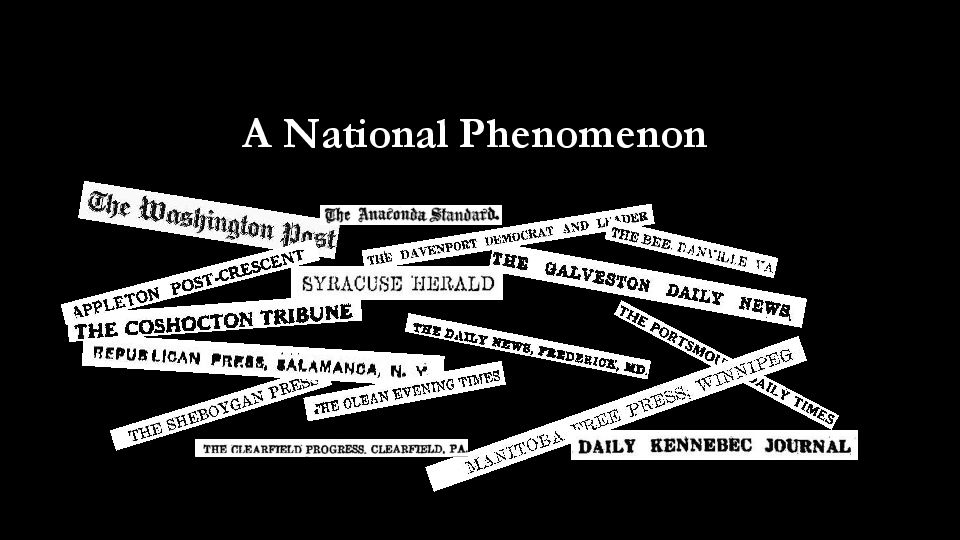America's history through the lens of 20th century broadcast media

Copyright 2020 Greenstone Media Consulting, LLC
Broadcast History
(Keep Growing Wiser Order of) Hoot Owls
KGW, Portland OR
1923 - 1933
NBC-Red
1928 - 1932 occasional
KAST, Astoria, OR
1930 - 1932
Occasionally carried on
KLX, San Francisco
1923 - 1933
NBC-Red
1928 - 1932 occasional
KAST, Astoria, OR
1930 - 1932
Occasionally carried on
KLX, San Francisco

The Hoot Owls were simply unlike anything else on the radio.
According to Platt’s account the program lays claim to being the first
variety show on radio, the first radio variety broadcast from a script,
the first radio quiz show and the first live audience program broadcast
from a remote location.
The Hoot Owls were an immediate sensation. Within hours of their
first broadcast, membership applications poured in by telephone and
wire -- but were all rejected because the Hoot Owls insisted that all
applications be submitted by written letter. Hoot Owl members also
had to be male (there’s more to be said about that later in this
chapter) and had to agree to abide by the Hoot Owls’ simple pledge to
“scatter sunshine, help Brother Hoot Owls in distress” and to attend
the meetings”. Bishop Frederick W. Keater of Tacoma was inducted
“and he had no more brushed the goat hair off the seat of his trousers
and plucked the owl feathers out of his hair when some of his Tacoma
friends were on the long-distance telephone congratulating him for
entering such a lively organization”.
Within two days of the first broadcast “the mail for [the Hoot Owl]
department broke all records”, the Oregonian reported. On the third
program membership applications were announced from King
Tutankhamen (who noted that he enjoyed the program while
excavators were fussing around outside his bedroom) and the entire
Elks Club of Redding, California (who were listening on a Magnavox
amplifier and horn speaker), among others. The original Hoot Owl
programs were so boisterous that listeners began to inquire whether
any intoxicants were being used to stimulate the entertainment.
Perhaps that had been the case because Ronald Callvert was then
formally given the assignment of assuring that suitable alcoholic
restraint was observed -- which explains the derivation of his Degree
Team title, Grand Skidoo. Actress and amateur historian Helen Pratt,
who served as KGW’s public affairs director in the 1950s, wrote in an
unpublished history of KGW: The Hoot Owl hilarity was the natural
result of a congenial group of exceptionally clever and talented men,
born entertainers, who loved to clown, putting on a show for the fun
of it and having a wonderful time. That was the secret of the
program’s amazing popularity. It wasn’t the show itself, good as it
was, it was the gusto of the performers, the exuberant, carefree
spontaneity that the audience loved.
To say the program was
spontaneous would be an
understatement. In May, 1931
Oregon Governor Julius Meyer
appointed Harry Grannatt and
Ted Baum to the State Fair
Committee with the
assignment of assisting in the
Fair’s publicity planning. During
their May 8 broadcast,
Portland chief of police
Jenkins interrupted the Hoot
Owls’ live broadcast to arrest
Grannatt and Baum on air “for
stealing police badges in the
state capitol”. The pair had
apparently purloined them as a
prank, while attending a
meeting of the State Fair
Committee, in a pre-arranged
stunt to promote the Fair. Dean Collins was additionally arrested on air
“for making a nuisance of himself” when he interfered with Jenkins’
efforts to arrest the other two.
Following the arrests, the remaining cast members were left to finish
the program on their own. The badges “weren’t worth 39 cents”
according to Governor Meier, who nevertheless stated that he
believed the badges were an emblem deserving respect. Meier
appointed a special prosecutor, Multnomah County Judge William A.
Ekwall (himself an occasional performer on programs like the Hoot
Owls) while the arrested trio retained defense counsel. On the
premise that they were arrested in the hearing of thousands of radio
listeners, it was decided that the preliminary hearing should also be
broadcast live during the following week’s Hoot Owls program. In
succeeding weeks, various on-air “trials” carried on the prank although
history doesn’t record the outcome of this good-natured stunt.
A National Phenomenon
While only occasionally being carried on the NBC network, the Hoot
Owls were a national sensation and newspapers across the country,
(including these) regularly carried listings in their “best bet” program
listings.
Copyright 2020 Greenstone Media Consulting, LLC
